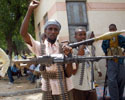
Over 80 people have been killed this week by fighting between militant group al-Shabaab and Somali government troops backed by African Union forces in the capital of Mogadishu. Al-Shabaab, which has links to al-Qaeda in east Africa, announced on Monday that it would escalate its war against the fragile Somali government, and followed up with four straight days of fighting thus far.
The violence peaked on Tuesday, when over 30 people, including members of the Somali parliament, were killed in an attack on a hotel in a neighborhood of Mogadishu that is nominally under the control of government forces. Tuesday night, members of al-Shabaab made a push toward the presidential palace, but were repelled by African Union peacekeepers.
President Obama’s counterterrorism and homeland security advisor John Brennan said on Tuesday that al-Shabaab’s agenda is “something that we are very concerned about,” and called the hotel attack “a particularly outrageous act during the Islamic month of Ramadan.”
In mid-July, al-Shabaab claimed responsibility for two bombings in Uganda that left more than 70 people dead—demonstrating in its first international attack a reach and capability further than most expected. In response, the African Union pledged an additional 4,000 troops to its peacekeeping mission; hundreds of peacekeepers from Uganda arrived on Monday.
Domestic and international pressure is mounting for the Obama administration to prevent Somalia from becoming the next AfPak. According to AP, thirteen House Democrats called for increased U.S. support and action on Somalia in a letter to Secretary of State Hillary Clinton in July:
Al-Shabab-controlled territory in Somalia is becoming a safe haven for terrorists from around the world. The United States must not sit back. … Extremists in Somalia have already made clear their intentions to harm us, and if they have not done so already, they will soon seek capabilities to carry out attacks in the United States.
Foreign Policy’s Elizabeth Dickinson blogged about similar warnings coming from Kenya’s new U.S. ambassador Elkhanah Odembo, quoting the ambassador as saying, “You can’t make this investment in Afghanistan and Pakistan and not worry about where the terrorists are going to. And the one place that we know for certain they are going to is Somalia.”
Fears of a new terrorist haven are not the only reason why the Obama administration should be seized with Somalia, a country that had 1.5 million people displaced at the end of last year and is deemed a “humanitarian crisis” by the U.N. In a recent report the Internal Displacement Monitoring Center described the situation on the ground in stark terms:
The civilian population continues to face threats to their life and human dignity, and IDPs have continued to face threats, intimidation, looting, assault, and sexual and gender-based violence. The violence and conflict have stretched peoples’ coping strategies as livelihood opportunities and access to food is further limited.
As Enough has previously argued, past U.S. counterterrorism efforts in Somalia have had a tendency to worsen the situation for both Somalis and the United States. Let’s hope that current efforts learn from those lessons and recognize that improving the day-to-day lives of Somalis must be an essential part of preventing Somalia from becoming a haven for international terrorism.
Photo: Militant fighter in Somalia. (AP)

